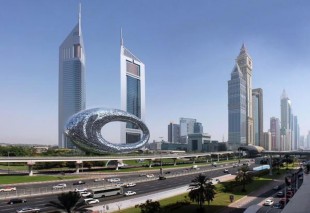

HH Sheikh Mohammed unveils Museum of the Future

Dubai on Wednesday announced a plan to build the Museum of the Future, a circular building which will house some of the world’s latest inventions and will be a cornerstone of the emirate's focus on innovation.
“Today we have launched Museum of the Future, featuring innovation labs and a permanent exhibit for future inventions,” UAE Vice President and Prime Minister and Ruler of Dubai, HH Sheikh Mohammed bin Rashid Al Maktoum, said in a message on his official Twitter account.
“Museum of the Future is integrated environment empowering creative minds to test, fund and market ideas for futuristic prototypes & services…. Museum to offer advanced courses and specialised workshops, a destination for the best and brightest inventors and entrepreneurs… Museum of the Future is a first step of many to come, marking the beggening of great achievements,” he added as part of a series of tweets.
According to a video and image released on Wednesday, the circular-shaped building will be located next to the Jumeirah Emirates Towers near Dubai International Financial Centre (DIFC).
The move is part of Dubai’s focus on innovation and art. "Innovation is a prerequisite for excellence, assuring that creativity is original element for our future as the leadership is working hard to guarantee happiness for people and, on the other hand, confirm our country’s excellence,” Sheikh Mohammed said as he visited the Dubai Canvas Festival at The Beach, Jumeirah Beach Residence (JBR).
The Dubai leader also called on everyone to adopt innovation, in a bid to recognise quality achievements, the official state news agency WAM reported.
Director General of Dubai Media Office, Mona Al Marri, briefed Sheikh Mohammed on the festival’s concept and objectives in the light of his directives to change Dubai into an open-air museum and promote Dubai as the global home for innovation and art, meanwhile capturing Dubai’s spirit as one of the world’s fastest growing cities.
Last month, Sheikh Mohammed inaugurated the Museum of Future Government Services, an interactive, life-sized street which showcased how technology developed by a team of over 180 global experts will help transform healthcare, education, mobility and smart city planning.
The cultural initiative was unveiled as part of the third Government Summit, which this year was held under the theme, ‘Shaping Future Governments’.
At the opening of the museum, Sheikh Mohammed said: "Innovation is the key to prosperity, and governments must invest in research, development and innovation more than other sectors because they are closely related to the development of human life. Innovation is the best way to improve the quality of lifestyle, and it is not an option any more but an imperative, especially with the changes and rapid evolution witnessed by the world."
Built around a futuristic, interactive, life-sized street, the Museum of Future Government Services showcased how technology over the coming years will radically transform government services in areas such as healthcare, education, mobility and smart city planning. It also features a laboratory for research, design and innovation, particularly for government entities.
It was developed by an international team of 180 researchers, designers and experts from around the world, and was hoped it would pave the way for citizens and governments to work together to address future concerns.
As part of the unveiling, ASIMO, the most advanced robot in the world developed by Honda, displayed its capabilities and interacted with the Dubai ruler during his tour.
The museum also includes a "smart street" featuring ways for citizens to interact using virtual reality technology, while the "laboratory for future services" showcased ways for the government and private sector interact more effectively.
Self-driving car concepts have been developed to give a glimpse of the future of the automotive world, integrated with intelligent systems that will bring the concept of mobility to new levels.
The "personal cloud" concept was developed in collaboration with MIT University, which aims to provide energy efficiency in cooling and heating.
A section called "Fitzania: a healthy and enjoyable life" encouraged children to play fun games, while medical devices monitor their heartbeat, blood pressure and other vital life signs.
The "immersive virtual-reality interactive learning lab" explored the future of learning to shed light on how education can push the boundaries and expand to other regions, even other planets.
The "exoskeleton" area looked at how best to help elderly or disabled people who face movement difficulties or those who work in dangerous job environments, such as fire fighters or high rise construction workers.